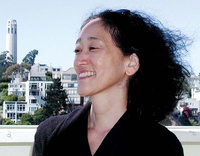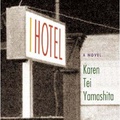Part 1 >>
Continuation of The Asian American Literary Review’s interview with Karen Tei Yamashita…
Kandice Chuh (KC): You write, “I’ve anticipated the end of the story without imparting the beginning. Knowing the story’s end does not necessarily imply completion of knowledge, for if many endings are possible, so also are many beginnings. History may proceed sequentially or, as they say, must proceed sequentially, but stories may turn and turn again—the knowing end kissing the innocent beginning, the innocent end kissing the knowing beginning” (326). There was some way that I think what you were talking about is captured here—that part of the act of this text is to go back and refigure beginnings, because it is about trying to figure out where we’re going, and not only where we’ve been—to see what this means in the contemporary moment.

Karen Tei Yamashita on the roof of the re-erected International Hotel in San Francisco. Author of "I Hotel" (Coffee House Press). Photo by Mary Uyematsu Kao.
Karen Tei Yamashita (KY): The structure of the book runs a decade from 1968 to 1977—this decade which perhaps defines the Asian American movement. I wanted to figure out how the history fit—how the recuperation of Japanese American internment and Mao coming to power and the history of Korea, along with artistic practices, all fit. You know, there’s something in “Asian American” that is already diasporic, already transnational in these days. This thinking in this period predates the current interest in globalism, and I wanted to understand it.
I spent hours and hours interviewing people who were involved, many who became academicians and many others who took another road. I wanted to understand where they came from. Early on, I realized that the thing was vast, and each person I interviewed clearly thought that she or he was in the center of the activities of “the movement.” I learned about everything from the formation of political parties and the fierce battles between groups, some sections of which were active up to the 1990s. Reflected in this work was the amazing commitment of those involved.
I was interested in learning why some people went through certain doors and others didn’t. Why were there two or more factions of the same movement created? I asked, why Lenin? I was told, because he had succeeded. There was a real sense of expectation of change. You know, we used to say things like “when the revolution comes,” and folks really believed in it—people maxed out their credit cards knowing that, when the revolution came, credit would be meaningless. And what about figures like Malcolm X, incredibly inspirational at the time? What could any of this teach us about how we got from there to here, what lessons to understand about theory and practice.
KC: Could you talk about how your practice, and especially the ways in which you went about researching and writing this book, informs your creative writing pedagogy? For example, you write in I Hotel, “If a play is any good, my opinion is that you ought to be able to strip it down and dress it all back up: So let me strip this down for you” (254). For you, is writing always an act of rewriting? Or reenactment?
KY: It’s interesting—I really had to learn my pedagogy for creative writing. I never went to writing workshops, and so I didn’t immediately understand their value. I learned to teach along the way. Now, I think I try to meet writers where they are. I ask: What is most satisfying about what you write? What do you read? What has what you read got to do with what you write? I try to start by asking what it is that a writer does. Sometimes a writer’s life is maybe not the best option. We talk about what the craft might be—about how we reproduce genres and sometimes try to subvert them. You know, it’s very difficult to do something really new. Sometimes, we’re writing about something in the air in the moment; or projecting what might be the future. In the end, it’s really all about the game of language—and on top of all this, we always still have to tell story. Do you want an audience or not? Who is that audience? Are there politics involved? You have to have something to say to be a writer.
I try to get through all this through the possibilities of voice—like the voices in I Hotel: what will a particular voice do? How will it limit and open possibilities?
KC: There’s something about the way in which you’re describing writing, and your emphasis on voice, that reminds me, again, of Manzanar’s worldview—what I describe as an ecological perspective. I don’t mean “ecological” to mean “green,” but ecological in the ways that Manzanar sees layers upon layers of meaning. At the very end of I Hotel, you write: “And in time we may remember, collecting every little memory, all the bits and pieces, into a larger memory, rebuilding a great layered and labyrinthine, now imagined, international hotel of many rooms, the urban experiment of a homeless community built to house the needs of temporary lives. And for what? To resist death and dementia. To haunt a disappearing landscape. To forever embed this geography with our visions and voices. To kiss the past and you goodbye, leaving the indelible spit of our DNA on still moist lips. Sweet. Sour. Salty. Bitter” (627).
KY: When you create a structure and place stories in juxtaposition, something happens that stirs and thickens the work. The project is asking questions and discovering answers as you go along—that’s the thrill of writing a book.
KC: The book also seems really interested in questions of genealogy, mentorship, and education, which I see as related topics.
KY: Right, mentorship. I originally thought that the movement was a bunch of young cocky kids. But, none of this could’ve happened without people who were older—graduate students, professors, internees, war veterans. They all brought expertise and knowledge and experience. Scholars conducted study groups and classes in the community. They opened spaces to students. The manongs, nisei artists, freedom riders, closet communists and socialists—in gathering oral histories, I began to understand how central their mentorship was. There were elder Chinese communists who were hidden and afraid of discovery but who quietly supported the activists. And overseas students from Japan, Philippines, Taiwan, and Hong Kong who put themselves on the line, or behind the scenes, to help.
Yet in all of this, ego always gets involved, so things aren’t always clean—everything gets muddy. But the purposeful generosity of ego that everyone showed—without that, there would’ve been no movement. Mentors brought linguistic abilities and experiential and theoretical knowledge. You know, without the thinking, there would’ve been nothing.
At the same time, there were trade-offs. For example, the Criminology Department at UC Berkeley was abolished as Ethnic Studies was born. I’m not sure that there is a direct correlation, but the time period suggests it. What if the Crim Department still existed? What if that critique of the prison-industrial complex had been more integral to Asian American studies? Then again, Ethnic Studies has produced race theory—but was it a fair trade off, to get Asian American studies in the form that we got it and grew it? Revisiting the history, raising questions.
* * *
Karen Tei Yamashita is a Japanese American writer whose pioneering works of fiction include Through the Arc of the Rain Forest, winner of the American Book Award and The Janet Heidinger Kafka Award, Brazil Maru, named by The Village Voice one of the 25 Best Books of 1992, Tropic of Orange, finalist for the Paterson Fiction Prize, Circle K Cycles, and the forthcoming I Hotel.
* * *
* This interview will be published in The Asian American Literary Review, Issue 1 (April 2010). AALR is a not-for-profit literary arts journal, a showcase of the best of today’s Asian American literature. To learn more about the journal or purchase a subscription, visit us online at www.asianamericanliteraryreview.org, or find us on Facebook.
© 2010 Kandice Chuh




